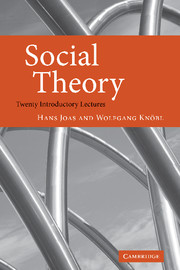Book contents
- Frontmatter
- Dedication
- Contents
- Introduction
- I What is theory?
- II The classical attempt at synthesis: Talcott Parsons
- III Parsons on the road to normativist functionalism
- IV Parsons and the elaboration of normativist functionalism
- V Neo-utilitarianism
- VI Interpretive approaches (1): symbolic interactionism
- VII Interpretive approaches (2): ethnomethodology
- VIII Conflict sociology and conflict theory
- IX Habermas and critical theory
- X Habermas' ‘theory of communicative action’
- XI Niklas Luhmann's radicalization of functionalism
- XII Anthony Giddens' theory of structuration and the new British sociology of power
- XIII The renewal of Parsonianism and modernization theory
- XIV Structuralism and poststructuralism
- XV Between structuralism and theory of practice: The cultural sociology of Pierre Bourdieu
- XVI French anti-structuralists (Cornelius Castoriadis, Alain Touraine and Paul Ricoeur)
- XVII Feminist social theories
- XVIII A crisis of modernity? New diagnoses (Ulrich Beck, Zygmunt Bauman, Robert Bellah, and the debate between liberals and communitarians)
- XIX Neo-pragmatism
- XX How things stand
- References
- Author index
- Subject index
IX - Habermas and critical theory
Published online by Cambridge University Press: 05 June 2014
- Frontmatter
- Dedication
- Contents
- Introduction
- I What is theory?
- II The classical attempt at synthesis: Talcott Parsons
- III Parsons on the road to normativist functionalism
- IV Parsons and the elaboration of normativist functionalism
- V Neo-utilitarianism
- VI Interpretive approaches (1): symbolic interactionism
- VII Interpretive approaches (2): ethnomethodology
- VIII Conflict sociology and conflict theory
- IX Habermas and critical theory
- X Habermas' ‘theory of communicative action’
- XI Niklas Luhmann's radicalization of functionalism
- XII Anthony Giddens' theory of structuration and the new British sociology of power
- XIII The renewal of Parsonianism and modernization theory
- XIV Structuralism and poststructuralism
- XV Between structuralism and theory of practice: The cultural sociology of Pierre Bourdieu
- XVI French anti-structuralists (Cornelius Castoriadis, Alain Touraine and Paul Ricoeur)
- XVII Feminist social theories
- XVIII A crisis of modernity? New diagnoses (Ulrich Beck, Zygmunt Bauman, Robert Bellah, and the debate between liberals and communitarians)
- XIX Neo-pragmatism
- XX How things stand
- References
- Author index
- Subject index
Summary
Any attempt to describe the development of sociology worldwide from the mid-1960s must inevitably make mention of the palpable shift in the locus of theoretical production that occurred during this period. If modern sociological theory was initially linked closely with the name of the American Talcott Parsons, and if the rival approaches of neo-utilitarianism, ethnomethodology, symbolic interactionism and – with major caveats – conflict theory were also ventures strongly influenced by their American context of origin, theoretical work in sociology was subsequently ‘Europeanized’ to a quite astonishing degree. The reason for this change is, paradoxically, to be found above all in the higher degree of professionalization characteristic of US sociology, which was established as an independent university discipline with a clear profile more rapidly than in Europe. As a result, scepticism towards the theoretical diversity that emerged following the end of the Parsonian hegemony set in very quickly and to a greater extent than in Europe. Many American sociologists interpreted this diversity as the fragmentation of the discipline or as an expression of damaging (political) ideologization that threatened to undermine the professional identity of sociology that had taken so much hard work to achieve. Thus they either stuck with existing, seemingly ‘tried and tested’ theoretical schools (primarily Parsonianism and the rational choice approach), attempting merely to refine or slightly modify them – or they turned away from grand theories entirely, concentrating exclusively on empirical research. In brief, theoretical work was increasingly marginalized.
- Type
- Chapter
- Information
- Social TheoryTwenty Introductory Lectures, pp. 199 - 221Publisher: Cambridge University PressPrint publication year: 2009

